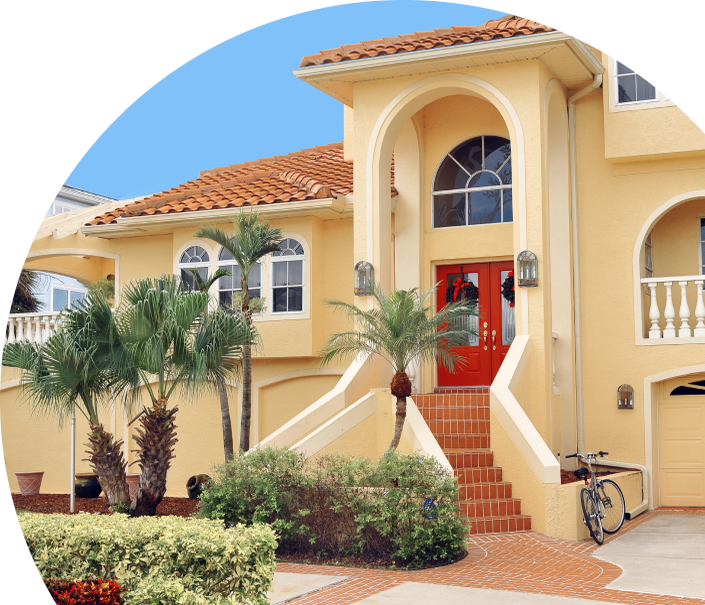Does flood insurance cover hurricanes?
The answer to this question may be a bit more complex than it initially seems, and there are multiple reasons for this. First, and probably most importantly, flood insurance is not included under the provisions of a standard homeowners' insurance policy.
Many homeowners secure their flood insurance under a separate policy managed by the federal government's National Flood Insurance Program, but private insurers may also offer coverage options. For example, we offer flood coverage as an endorsement to homeowners insurance policy to members in both Florida and Louisiana.
The relationship between flood insurance and hurricanes
The close relationship between flooding and wind damage has created the impression that a single, separate hurricane policy exists. People generally use the term “hurricane insurance” to refer to the act of covering your home from high winds and flood water, the two destructive forces attributed to hurricanes.
But for the most part, these two forces are treated separately by the insurance industry. Hurricane wind damage is a covered peril in most home insurance policies. Flooding, however, is not – which is why many homeowners need flood insurance. It typically covers rising waters that damage homes from the outside, such as overflow from lakes and rivers and flooding from heavy rains.
Flood insurance can also cover water damage from storm surges and tidal flooding. You should note, however, that flood policies usually don’t cover flooding that starts in the home. That type of flood damage may be covered by your home insurance policy, depending on the cause of the flooding.
The standard homeowner’s policy is designed to provide coverage for your home during a catastrophic event but does not cover flooding.
Hurricane insurance vs. flood insurance
Where hurricane coverage ends and flood insurance begins can be hard to assess, so let’s look at a few sample scenarios.
-
Scenario 1: A hurricane hits the coast of Florida and tears the roof off your house. Without its roof and exposed to the hurricane’s torrential rain, the home is flooded. Because the water damage was a result of the wind’s damage to the roof, your hurricane insurance would likely cover both the roof and water-related repairs.
-
Scenario 2: A hurricane strikes, but your home stays miraculously intact despite the incredibly strong winds. However, your street is flooding from the storm surge and downpour, and your basement floods. Because hurricane wind damage didn’t create an opening for the flooding, you would need flood insurance to pay for this water damage.
-
Scenario 3: This time, a hurricane hits your home and rips an opening in your roof, allowing the downpour into your home. Your street is also flooded from the heavy rains and storm surge. This makes it hard to separate which was the true source of flood damage to the home – the storm surge from the flooded street or the opening in your roof that let all the water in – so both your hurricane and flood insurance providers need to investigate to determine the cause.
These scenarios are meant to be illustrative only. Every insurance company has its own criteria for assessing damage and its source. That’s why, if you live in a region prone to hurricanes and flooding, it’s smart to have both hurricane and flood insurance. You never know when you’ll need them.
Having the right expectations for coverage
Knowing how hurricane insurance works – and how it’s different from flood insurance – is essential for protecting homes in coastal areas. If you don’t understand what’s covered, you may find that you’re underinsured when the next hurricane hits.
Common misperceptions about home insurance
- Hurricane coverage protects against winds and flooding.
- Flood insurance is included under standard home insurance.
- Finding affordable home or flood insurance is impossible.
But you should also know that the hurricane coverage in your policy is only one part of protecting your home. The second part is minimizing risks. Hardening your home against hurricane damage goes a long way toward reducing damage and keeping insurance premiums affordable.
How do hurricane deductibles work?
As mentioned earlier, your hurricane deductible is separate from the standard AOP deductible that applies to other covered perils, such as fire, theft, or vandalism claims.
While your general deductible is usually a flat dollar amount, your hurricane deductible is a percentage of the coverage you have for your dwelling. These are usually:
So if you have $300,000 in dwelling coverage and a 2% hurricane deductible, your out-of-pocket expense for a hurricane claim would be $6,000.
Your hurricane deductible is triggered by specific conditions outlined in your policy. Generally, a storm declared as a hurricane by the National Weather Service or a named storm triggers this deductible.
Deductible options may vary based on state regulations. For example, Florida insurers are required to offer hurricane deductible options of $500, 2%, 5% and 10%.

